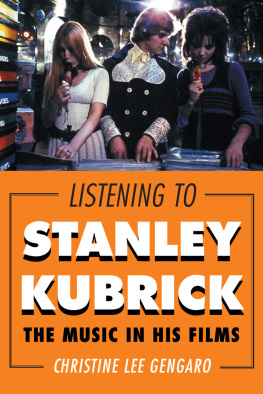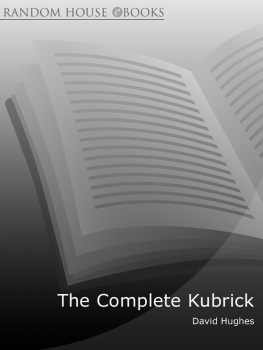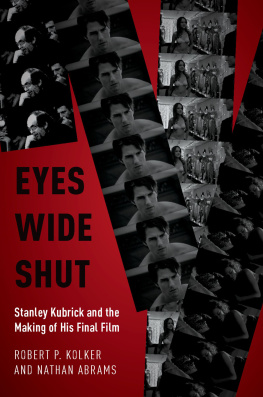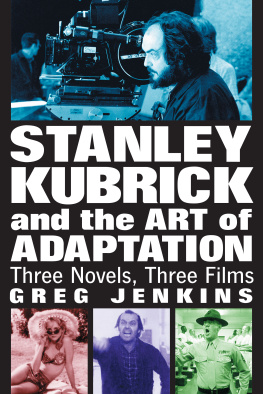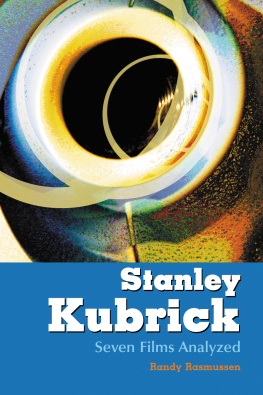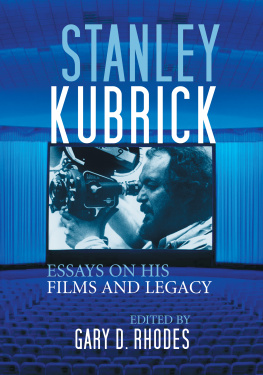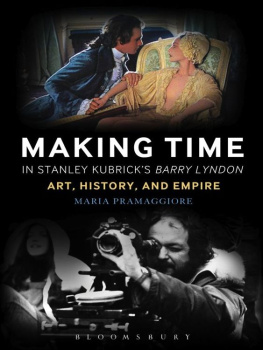Gengaro Christine Lee - Listening to Stanley Kubrick : the music in his films
Here you can read online Gengaro Christine Lee - Listening to Stanley Kubrick : the music in his films full text of the book (entire story) in english for free. Download pdf and epub, get meaning, cover and reviews about this ebook. City: Lanham, year: 2014, publisher: Rowman & Littlefield, genre: Non-fiction. Description of the work, (preface) as well as reviews are available. Best literature library LitArk.com created for fans of good reading and offers a wide selection of genres:
Romance novel
Science fiction
Adventure
Detective
Science
History
Home and family
Prose
Art
Politics
Computer
Non-fiction
Religion
Business
Children
Humor
Choose a favorite category and find really read worthwhile books. Enjoy immersion in the world of imagination, feel the emotions of the characters or learn something new for yourself, make an fascinating discovery.
- Book:Listening to Stanley Kubrick : the music in his films
- Author:
- Publisher:Rowman & Littlefield
- Genre:
- Year:2014
- City:Lanham
- Rating:5 / 5
- Favourites:Add to favourites
- Your mark:
- 100
- 1
- 2
- 3
- 4
- 5
Listening to Stanley Kubrick : the music in his films: summary, description and annotation
We offer to read an annotation, description, summary or preface (depends on what the author of the book "Listening to Stanley Kubrick : the music in his films" wrote himself). If you haven't found the necessary information about the book — write in the comments, we will try to find it.
Listening to Stanley Kubrick : the music in his films — read online for free the complete book (whole text) full work
Below is the text of the book, divided by pages. System saving the place of the last page read, allows you to conveniently read the book "Listening to Stanley Kubrick : the music in his films" online for free, without having to search again every time where you left off. Put a bookmark, and you can go to the page where you finished reading at any time.
Font size:
Interval:
Bookmark:
Listening to Stanley Kubrick
The Music in His Films
Christine Lee Gengaro

THE SCARECROW PRESS, INC.
Lanham Toronto Plymouth, UK
2013
Published by Scarecrow Press, Inc.
A wholly owned subsidiary of The Rowman & Littlefield Publishing Group, Inc.
4501 Forbes Boulevard, Suite 200, Lanham, Maryland 20706
www.rowman.com
10 Thornbury Road, Plymouth PL6 7PP, United Kingdom
Copyright 2013 by Christine Lee Gengaro
All rights reserved . No part of this book may be reproduced in any form or by any electronic or mechanical means, including information storage and retrieval systems, without written permission from the publisher, except by a reviewer who may quote passages in a review.
British Library Cataloguing in Publication Information Available
Library of Congress Cataloging-in-Publication Data
Gengaro, Christine Lee.
Listening to Stanley Kubrick : the music in his films / Christine Lee Gengaro.
p. cm.
Includes bibliographical references and index.
ISBN 978-0-8108-8564-6 (cloth : alk. paper) ISBN 978-0-8108-8565-3 (ebook)
1. Kubrick, StanleyCriticism and interpretation. 2. Motion picture musicHistory and criticism. I. Title.
ML2075.G46 2013
781.5'42dc23
2012027850
 The paper used in this publication meets the minimum requirements of American National Standard for Information SciencesPermanence of Paper for Printed Library Materials, ANSI/NISO Z39.48-1992. Printed in the United States of America.
The paper used in this publication meets the minimum requirements of American National Standard for Information SciencesPermanence of Paper for Printed Library Materials, ANSI/NISO Z39.48-1992. Printed in the United States of America.
Contents
Acknowledgments
This book could not have been written without the help and cooperation of many parties. Several archives and libraries were kind enough to allow me access to their collections. These include the Margaret Herrick Library Department of Special Collections, which houses archives for the Academy of Motion Pictures of Arts and Sciences, and the American Heritage Center at the University of Wyoming. I offer special thanks to the Stanley Kubrick Film Archive, LLC, Warner Bros., and University of the Arts London for permission to use their materials. I am grateful also to the Anthony Burgess Foundation and Burgess experts all over world for allowing me a forum for my work on A Clockwork Orange .
Special thanks must be given to Jan Harlan, who offered time and expertise in conjunction with this project. Gerald Fried shared his recollections with me and kindly gave his permission for the use of his scores for Kubricks early films. Jocelyn Pook granted me an interview and generously answered any and all questions about her participation in Eyes Wide Shut . Friend and colleague Jon Burlingame deserves special thanks for immediately and unfailingly lending me his unique expertise in film music. His liner notes to the 2007 Intrada CD of Alex Norths lost score were particularly helpful in the completion of chapter 3, and his own interview with Jocelyn Pook enhanced the final chapter. These wonderful people are in no way responsible for any inaccuracies in the book that may remain.
I am indebted to far too many friends to name, but I wish to recognize a few. Mike deHilster and Dr. Vanessa Rogers read through many versions of this manuscript and offered suggestions for its improvement. Fellow musicologist and film music specialist Katherine McQuiston has generously shared her time and her expertise on the subject of Kubrick and music. I would also like to give special thanks to Helen Moulinous and Daniel Stent, Andrea Moore, David Aguilar, Cael Marcus Edwards, and Thomas Witwer for their helpful comments. Finally, I must thank my mother, Geri, my father, Frank, and my sister, Michelle, for their unceasing love and support. Special recognition must go to my father for supplying me with classical music and soundtrack LPs in my formative years, for sharing his musical expertise on doo-wop for chapter 7, and for giving me my first copy of A Clockwork Orange , thereby starting this whole thing.
Introduction
Music in film is powerful. It enhances emotion, signals danger, accompanies epiphany, and depicts movement. It forms the aural element of an invented world, contributing to its authenticity and its vitality. Those directors who truly understand the power of music will create films that use it wisely and well. Stanley Kubrick is one of a handful of directors whose musical choices over the course of his career demonstrated a keen understanding of what music could bring to a film, and through almost fifty years and more than a dozen film projects, Kubricks musical sensibilities developed and became finely tuned. The music in his films displays insight, inventiveness, and vision. Furthermore, Kubricks musical choices have affected the world outside of his films, influencing cultural consumption of certain pieces of classical music. It seems appropriate then to compile a guide detailing the music in Kubricks films, both the traditional scores and the preexistent music chosen for the later films. Kubricks musical journey has often been overshadowed by other aspects of his workhis films visual look, his meticulous, near-obsessive work habits, his unwillingness to travel or appear in publicbut music is a very important element of Kubricks art, one that needs analysis if it is to be truly appreciated.
Kubricks use of music is certainly one of the things that have made his films legendary, and we must wonder where his affinity for music originated. Indeed, we wonder what combination of influences created all aspects of Kubricks filmmaking genius. Many biographers and Kubrick scholars have spent much time and many pages searching Kubricks past for clues to his greatness, for indicators in his childhood and young adulthood that would signal the development of a genuinely singular talent. Each book (including this one) dutifully explains similar aspects of Kubricks origin story. Stanley Kubrick was born in the Bronx in 1928. As a boy, he didnt care much for school. He loved playing chess, and he had an eye for photography. All biographies mention his supportive parents Jacques and Gertrude, and his little sister, Barbara. Special mention is usually made of the strong intellectual relationship Kubrick had with his father, a doctor. It was his father who both introduced him to chess and gave him his first camera. Kubricks parents allowed Stanley the academic freedom to pursue his own projects, and they trusted him enough to let him learn on his own. One of these passions, photography, started Kubrick on a career path while he was still a teenager.
Another of Kubricks early passions, chess, might have sent him down a different path. He was a good player, hustling games for money as a young man, but he quickly discovered that chess hustler is not a good career, although his skill at the game seems to many to be one of those important indicators of Kubricks future success. Interviewer Michel Ciment stated that Kubricks passion for chess taught him the art of strategy, which helped his storytelling. When asked if chess influenced his filmmaking, Kubrick spoke of the connection between chess and decision making, especially in the way it allows one to avoid the impulsive decision and deliberate the alternatives patiently. No one would argue that Stanley Kubrick wasnt deliberate in his decision making in his films. As he got older, and his films got further and further apart, this deliberation was quite long indeed.
Music too was a part of Kubricks formative years, although less important to him than chess or photography. He was the drummer for his high school jazz band, and he was a great lover of all genres of music, even film scores. One score in particular stands out as a great influence, and indeed Kubricks admiration of this score has been mentioned by a number of biographers. According to childhood friend Alex Singer, Kubrick was so taken with the music of Alexander Nevksy that after seeing the film as a young man, he purchased the soundtrack album. Showing a tendency toward obsession that would come to be associated with him, he played the record so much and so often that his sister apparently broke it out of frustration. The power of this film score certainly affected him, and the film itself was a landmark.
Font size:
Interval:
Bookmark:
Similar books «Listening to Stanley Kubrick : the music in his films»
Look at similar books to Listening to Stanley Kubrick : the music in his films. We have selected literature similar in name and meaning in the hope of providing readers with more options to find new, interesting, not yet read works.
Discussion, reviews of the book Listening to Stanley Kubrick : the music in his films and just readers' own opinions. Leave your comments, write what you think about the work, its meaning or the main characters. Specify what exactly you liked and what you didn't like, and why you think so.

